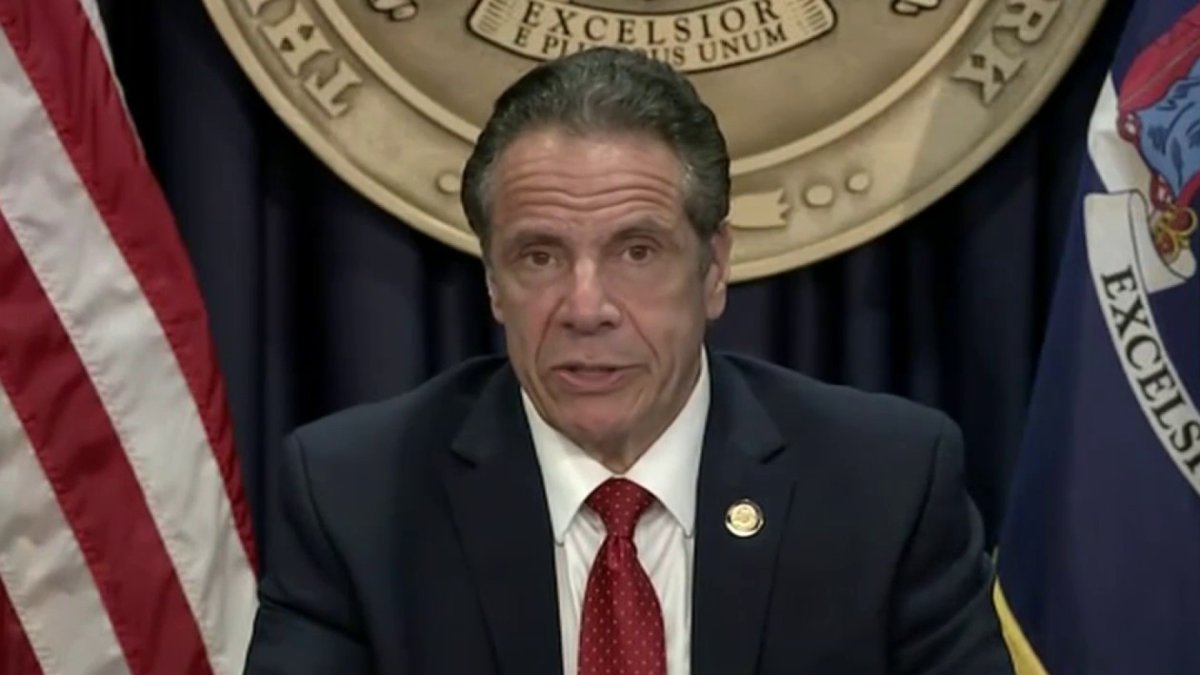
The governor tried to talk coronavirus and the state budget on Wednesday, in an effort to avoid answering questions regarding the sexual misconduct and nursing home death scandals surrounding him. NBC New York’s Jonathan Dienst reports.
A new report states that top aides to New York Gov. Andrew Cuomo repeatedly overruled and tried to obscure numbers from state health officials regarding the COVID-19 death toll in nursing homes.
The New York Times reported on Wednesday that aides such as Melissa DeRosa and others actively tried to stop state health officials, including Health Commissioner Howard Zucker, from sharing the latest numbers with the public or state lawmakers. The actions occurred around the same time that Cuomo was pitching and then writing his book on the pandemic.
Other steps to interfere included not publishing a scientific paper that incorporated the data, not sending a letter from the state Health Department to legislators, and holding onto an audit of the numbers for months before they became publicly known, the Times reported.
The complete data set on nursing home deaths wasn't released until earlier in 2021, after State Attorney General Letitia James found that New York may have undercounted COVID-19 deaths among nursing home residents by thousands, as much as 50 percent. But some Cuomo aides had known that proper figure since spring, according to the Times.
Get Tri-state area news and weather forecasts to your inbox. Sign up for NBC New York newsletters.
Elkan Abramowitz, who is representing Cuomo's office, said the administration was hesitant to release the numbers because they were unsure if they were reliable.
"The chamber was never satisfied that the numbers that they were getting from DOH were accurate," Abramowitz told the Times.
Cuomo held a news conference in Buffalo on Thursday, where reporters were quick to pounce on the Times story. The governor stuck to his position.
"Our No. 1 concern, especially in this super-heated political environment, was whatever number we put out, had to be accurate, because we're being criticized by both sides," he said. "The number itself was always going to change. It's not that anybody was trying to secret a number, because it wasn't about the number, it was about the accuracy of the number."
The Times also highlighted a Health Department report that was allegedly rewritten by Cuomo senior advisers a number of times. The final draft of that report insisted that admissions coming from hospitals were "not a driver of nursing home infections or fatalities," instead saying that staff were the likely cause of spreading infections.
However, a previous draft included a section that put the number of nursing home residents at more than 9,700, which was much higher than the administration was saying at the time, the report said. It also stated that about "35 percent" of deaths in the state were nursing home residents — but the report released to the public was changed to say 21 percent.
The Times report comes after Cuomo’s office said it won’t reveal what it told the U.S. Justice Department about COVID-19 outbreaks in nursing homes, partly because doing so would be an “invasion of personal privacy.”
The Justice Department last year asked the governors of several states, including New York, to turn over certain, basic statistics related to deaths and infections inside nursing homes.
That federal request, initially made in August and later expanded in October, followed reports by The Associated Press and other news organizations that the state’s official nursing home death toll was likely a significant undercount.
Cuomo’s began sending records to federal investigators last year. But his office has now denied a request from The Associated Press for copies of those documents.
That’s despite Cuomo himself, in mid-February, saying he supported releasing the records.
“Look, I would have no problem with it,” said the governor, who as New York’s attorney general oversaw many complex criminal investigations. “I would have to have the lawyers talk to DOJ, but I would have no problem with it.”
Releasing the documents would “constitute an unwarranted invasion of personal privacy,” the governor’s records access officer, Jaclyn Clemmer, wrote in a letter dated April 15.
She didn’t explain whose privacy might be invaded, or how.
The public also isn’t entitled to see the records because they were “compiled for law enforcement purposes” and their disclosure would “interfere with law enforcement investigations,” Clemmer wrote.
Under state public records statutes, law enforcement agencies are allowed to withhold records related to ongoing criminal investigations. But in this case, the governor’s office has applied the exemption to data initially compiled for public health purposes which was sent to the Justice Department’s civil division.
Cuomo has since said it was a mistake to take so long to release the statistics, but he insisted the delay was not an attempt to obscure the death toll. The administration said it didn’t release a full tally sooner because it needed time to verify how many nursing home patients died after being transferred to hospitals.
The administration’s handling of the data is now the subject of an FBI investigation and an inquiry by the state Assembly, which is assessing whether there are grounds to impeach Cuomo.
In its document requests, the Justice Department asked for the number of residents, staff and visitors who contracted COVID-19 or died of the virus and the number of people admitted to each nursing home after being treated for COVID-19 at a hospital.
In his response, Michigan’s Chief Legal Counsel Mark Totten told the Justice Department he was concerned about the fairness of the investigation, which was aimed at states with governors who are Democrats.
“The U.S. Department of Justice has a long tradition of exercising its considerable power in an impartial and non-partisan manner and we are concerned your letter departs from that tradition,” Totten said.